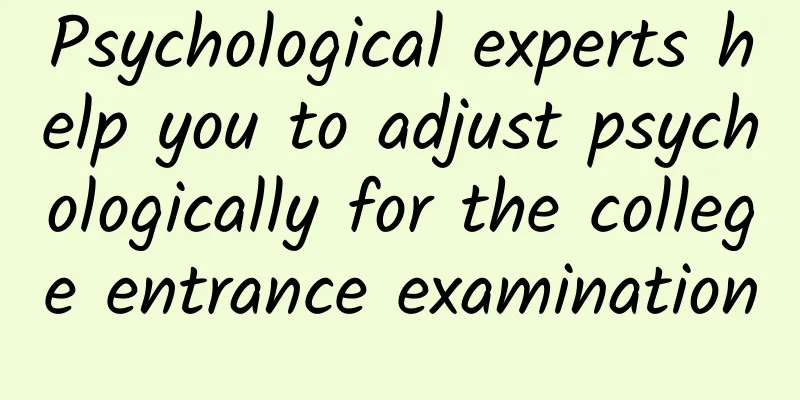Psychological experts help you to adjust psychologically for the college entrance examination

|
Examination is an important psychological stress event that students have to face in their study and life, and it is inevitable. As the college entrance examination approaches, candidates will inevitably experience tension, anxiety, insomnia, etc. This is a typical and common stress phenomenon, which we call test anxiety. There are many factors that lead to test anxiety, including subjective factors such as high self-expectations, insufficient knowledge preparation and test-taking skills, lack of self-confidence, poor physical condition before the test, etc.; objective factors such as pressure from parents, teachers or competition among classmates. American psychologists Yerkes and Dodson have confirmed that the relationship between motivation intensity (anxiety level) and work efficiency (performance) is not a linear one, but an inverted U-shaped curve. When motivation is at an appropriate intensity, work efficiency is optimal; when motivation intensity is too low, there is a lack of enthusiasm for participating in activities, and work efficiency cannot be improved; when motivation intensity exceeds the peak, work efficiency will continue to decline as the intensity increases, because excessive motivation will put the body in an overly anxious and tense psychological state, interfering with the normal activities of psychological processes such as memory and thinking. Therefore, moderate test anxiety will help increase the excitability and sensitivity of the brain, stimulate the examinee to be in an active perceptual state of thinking, and enable him to perform better; but overly anxious examinees often have more physiological, psychological and behavioral reactions to the test, resulting in adverse consequences. The manifestations of excessive anxiety can be physiological reactions such as rapid breathing, rapid heartbeat, sweaty palms, frequent urination, stage dizziness, etc., or psychological aspects such as fear and worry; there can also be behavioral manifestations such as being at a loss, restless, and even afraid to take exams. If you have excessive test anxiety, how should you deal with it? What are some ways to adjust yourself? Cognitive self-regulation Increase your self-confidence and believe that you are the best at this moment No matter how you have learned before, or how much content you feel you have not had time to review, or how much you still need to miss, from now on, don’t regret it or complain. Believe in yourself and be prepared. This is your best state, and you can face the exam. Have a clear understanding of your exam goals. No matter what goals your parents and teachers set for you, set an achievable goal for yourself in your heart. Goals that are too high and unrealistic will only increase test anxiety. Accept your anxiety. If you find yourself anxious, don't be afraid. This is a normal reaction to stressful events. You don't have to suppress it or try to drive away this emotion. You can stop and feel it quietly, taking some deep breaths. Emotional self-regulation 01. Practice mindfulness meditation Focus on the present moment. Don’t worry too much about the future or dwell on the past. Empty your mind, let go of your heart, and get rid of all desires and distractions. Focus on your breathing, relax your body, and try to breathe in and out slowly and deeply. When your thoughts start to wander, remember to focus on your breathing again. By breathing over and over again, you can improve your concentration and relieve stress. (Mindfulness meditation practice audio is attached at the end of the article) 02. Keep a mood diary Feel the anxiety and write down your worries and feelings in a diary so that you can see the reasons for your anxiety and analyze which ones are reasonable and which ones are unnecessary. 03. Have self-talk Tell yourself that I am great and capable enough to handle challenges and overcome difficulties. 04. Seek support You can talk to your family, friends or professionals to help you share your concerns. You can also let them share their own successful experiences and seek support and encouragement. Behavioral self-regulation 0 1. Do some exercise and listen to music. Do some physical activities, such as walking, jogging, yoga, etc., and listen to some relaxing and pleasant music. 0 2. Make a reasonable study plan. Make a reasonable study plan, avoid cramming at the last minute, arrange your time reasonably, do not review excessively the day before the exam, ensure adequate sleep, and avoid staying up late. 0**3. Avoid negative information. Reduce exposure to negative information, try to avoid excessive discussion of exams, avoid stressors, and maintain a stable mentality. About the Author Chen Min, deputy chief physician of the Department of Geriatrics, Beijing Longfu Hospital, majoring in psychiatry, expert member of the Science Popularization Committee of the Chinese Medical Education Association Expertise: Insomnia, anxiety, depressive disorders, obsessive-compulsive disorder and other psychosomatic diseases, mental disorders associated with physical diseases, post-traumatic stress disorder, and mental and psychological diseases in children and adolescents. |
<<: If smart drugs really exist, would you dare to take them?
>>: Start from the "heart" and don't let pre-exam anxiety become a stumbling block!
Recommend
Can I eat grapes?
Grapes are a very delicious fruit, and they come ...
Is it necessary to take Chinese medicine before pregnancy?
Women may undergo some physiological adjustments ...
Delicious fruits that are on the market recently can be eaten to control sugar and lose weight! Except for two situations...
Now is the time when plums are on the market in l...
What to do if pregnant women have blood in their stools
When a pregnant woman gets angry, the skin around...
Sciatica pain in 3 months of pregnancy
Pregnancy is a very difficult process, so everyon...
Flu is prevalent recently! Avoid injections and medications, this may save you from going to the hospital | Micro Health
recent Many friends showed up High fever, cough, ...
Treatment of bacterial vaginitis should start from these aspects
Although bacterial vaginosis is a very common gyn...
Why are contractions more severe at night?
Uterine contractions are a physiological phenomen...
Is it accurate to check TCT after having sex with a condom?
HPV, also known as human papillomavirus infection...
Why is my menstrual period too long?
Under normal circumstances, a woman's menstru...
I feel like I have my period but it's just water.
Everyone has some signs when they have their peri...
What are the disadvantages of caesarean section for women
I believe everyone is familiar with cesarean sect...
What foods are most likely to cause allergies? What is the pathogenesis of allergies?
In recent years, more and more people have sympto...
Can a "hole" melt an iceberg?
In 2014, American baseball player Pete Frates ini...









